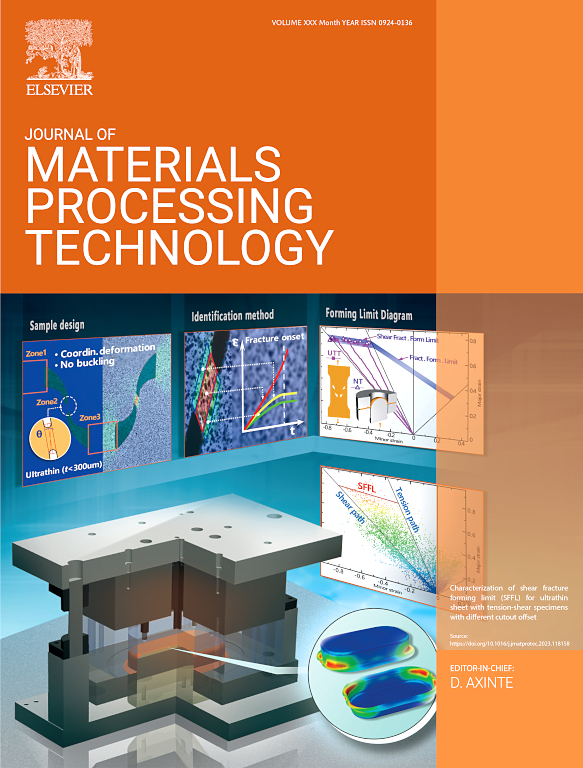同轴异质波长混合激光束的能量协同机制及其对铝合金焊接熔池动力学的影响
IF 6.7
2区 材料科学
Q1 ENGINEERING, INDUSTRIAL
Journal of Materials Processing Technology
Pub Date : 2024-09-18
DOI:10.1016/j.jmatprotec.2024.118605
引用次数: 0
摘要
本文采用能量分布为 "高斯+平顶 "的同轴异质波长混合激光束(HW-HLB)热源,将1080 nm和915 nm激光束集成在一起,实现了铝合金焊接的优异稳定性。以铝合金与不同波长激光束之间的相互作用机理为切入点,探讨了同轴 HW-HLB 的协同增强机理。根据焊接实验结果,建立了考虑双激光协同效应的 HW-HLB 焊接热流耦合模型。研究了光纤激光器功率(PF)和二极管激光器功率(PD)对焊接过程中熔池流动行为的影响。通过原位监测实验和热流模拟,阐明了熔池的动态和锁孔的维持机制。结果表明,与单光纤激光束(FLB)相比,HW-HLB 的功率密度显著增加,从而导致等离子体羽流的 "雪崩式 "增长,并加深了键孔的深度。PF=2800 W 和 PD=2500 W 的同轴 HW-HLB 的能量协同增强效应使熔池的形态和流动行为发生了更强烈、更彻底的变化。915 nm 激光束的引入改善了内锁孔的多重反射行为。我们的研究结果为通过实施 HW-HLB 提高激光焊接熔池的稳定性和铝合金的焊接质量提供了理论框架。本文章由计算机程序翻译,如有差异,请以英文原文为准。
The energy synergistic mechanism of coaxial heterogeneous-wavelength hybrid laser beam and its effect on welding molten pool dynamics for aluminum alloy
The coaxial heterogeneous-wavelength hybrid laser beam (HW-HLB) heat source featuring a “Gauss + Flat top” energy distribution, which integrates the 1080 nm and 915 nm laser beam, was employed in this paper to achieve excellent stability in the welding of aluminum alloy. The interaction mechanism between aluminum alloy and laser beams with different wavelengths was taken as a point cut to explore the synergistic enhancement mechanism of coaxial HW-HLB . A thermal-fluid coupling model for HW-HLB welding, considering the synergistic effect of dual lasers, was established according to the welding experiment results. The influence of fiber laser power (PF) and diode laser power (PD) on the molten pool flow behavior during welding process was investigated. The dynamic of the molten pool and the maintenance mechanism of the keyhole were elucidated through in-situ monitoring experiments and thermal-flow simulations. The results indicated that, in contrast to the single fiber laser beam (FLB), the power density of HW-HLB presents a significant increase, which results in the “avalanche-like” augmentation of the plasma plume, as well as deeper depth of the keyhole. The energy synergistic enhancement effect of coaxial HW-HLB with PF=2800 W and PD=2500 W performs stronger and thorough changes in the morphology and flow behavior of the molten pool. The introduction of 915 nm laser beam improves the multi-reflection behavior in the inner keyhole. The findings of our research provide a theoretical framework for improving the stability of the laser weld molten pool and the quality of welds in aluminum alloys through the implementation of HW-HLB.
求助全文
通过发布文献求助,成功后即可免费获取论文全文。
去求助
来源期刊

Journal of Materials Processing Technology
工程技术-材料科学:综合
CiteScore
12.60
自引率
4.80%
发文量
403
审稿时长
29 days
期刊介绍:
The Journal of Materials Processing Technology covers the processing techniques used in manufacturing components from metals and other materials. The journal aims to publish full research papers of original, significant and rigorous work and so to contribute to increased production efficiency and improved component performance.
Areas of interest to the journal include:
• Casting, forming and machining
• Additive processing and joining technologies
• The evolution of material properties under the specific conditions met in manufacturing processes
• Surface engineering when it relates specifically to a manufacturing process
• Design and behavior of equipment and tools.
 求助内容:
求助内容: 应助结果提醒方式:
应助结果提醒方式:


